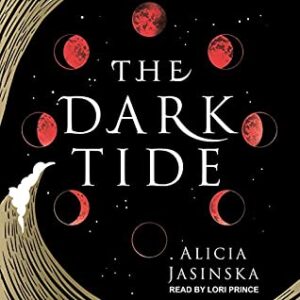Amazon Affiliate Link | Bookshop.org Affiliate Link
Every year the witch queen of Caldella must choose a lover from the town to sacrifice to the dark tide, saving the island and its people from annihilation. Every year another boy is taken and everyone accepts it. But when Lina’s brother is in danger of becoming the sacrifice, she can no longer sit idly by. Tomas—her crush and the only boy who ever escaped the witch queen’s sacrifice—helps her keep her brother safe, but ends up being taken again. Feeling guilty and not wanting to lose him, Lina sets out to his rescue and takes his place. Lina and the witch queen, Eva, butt heads at first, but they soon come to know each other better until they’re willing to fight for changes.
Perhaps it was the audiobook narration, but the overall story was underwhelming. The world-building and magic were the strongest aspects of the story. Magic is established straightaway as a luxury to be bought as spells and potions. It’s also shown that the dark tide is only kept at bay when the witch queen’s sacrifice is truly a sacrifice, meaning she has to love them.
The characters’ relationships never feel organic. On paper, they’re written as falling in love, with all the familiar markers of enemies to lovers. But the connection between Eva and Lina never feels authentic. Similarly, Lina’s love for Tomas is more of a crush. But this speaks to Lina’s tendency to romanticize everything. She lives in fantasy, thinking the world works as good and evil, with good prevailing and true love winning the day.
Lina’s relationship with her brother, Finley, is one of the more interesting dynamics that only touched the surface. Coming from her point of view, it seems like she and Finley fight like normal siblings. However, it’s established from the beginning that his anger was so violent that he ended up hurting her, leading to her broken ankle. Every time she thinks about the incident, she makes excuses saying she shouldn’t have made him angry and that he really loves her, but his temper gets the best of him. It’s the narrative her family has been telling her whole life, so of course, she believes that his actions are mistakes and not abuse. It’s not until Eva tells her that Finley abuses her and that she doesn’t have to accept that abuse that Lina begins to see their relationship differently.
Lina, with her head in fantasy and giving people the benefit of the doubt, plays the role of the “good girl,” while Eva, the literal witch who doesn’t allow others to disrespect her boundaries, is “evil.” These dynamics are the more intriguing storyline, but the book gets bogged down in trying to make their eventual romance the focus.
Content warning: abuse

